Float my boat. A double bill for the ages.
by Ryland Walker Knight
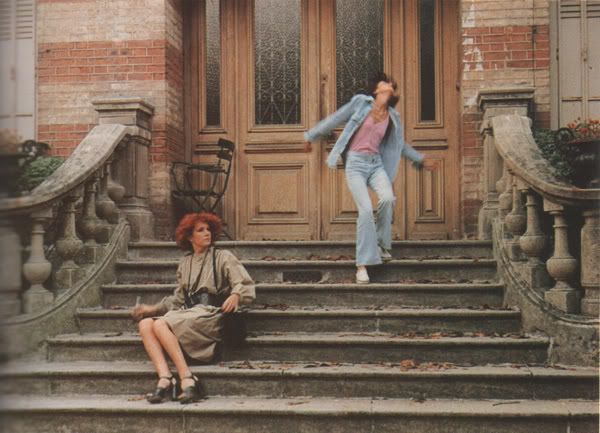
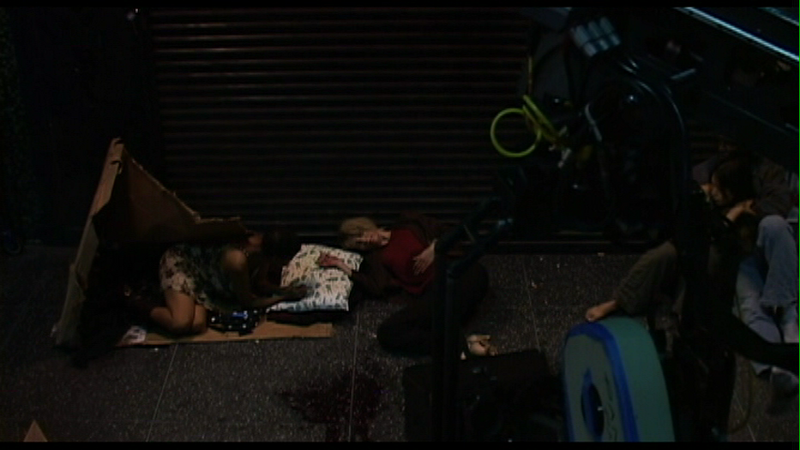
Sight and Sound asked 52 film critics and programmers and professors to put together a dream double bill and write a few words about their choices. You can see them all here in a pdf. I wrote something similar over a year ago for The House, a 5 for the Day post. I was proud my selections were adventurous and intuitive links between the films. Since then I think I've refined my ideas about the double bill and am not quite as interested in those kinds of outlandish pairings, although I dig the idea of cinephile parlour games like how can you link this film with that (real nerd shit). Also, those I chose were all relatively recent pictures. One of the cool things about this Sight & Sound group is that it skews towards older cinema as much as current cinema. But, still, there's one in particular, from Brad Stevens, that I would gladly pay money for: Céline et Julie vont en bateau with INLAND EMPIRE. Here's his little graf --
"Nothing analyses a film better than another film," wrote French critic Nicole Brenez. And, although the result would run for an unwieldy six hours, the best way to fully appreciate Inland Empire [sic]--among the most misunderstood films of recent years--may be to watch it with Céline et Julie vont en bateau. These masterpieces set out to liberate women from the narrative traps in which cinema has traditionally imposed them. Both Rivette and Lynch deconstruct the act of storytelling from an explicitly feminist perspective, showing their heroines negotiating, and ultimately escaping from, houses of fiction. But whereas Rivette takes female solidarity as his starting point and ends by suggesting that the narrative is about to begin again, Lynch brings in female solidarity only during the final stages: the prerequisite for its existence being an acknowledgment, both devastating and joyous, that narratives are no longer possible.
A few things pop to mind: This bill would definitely run more than six hours; that word deconstruct sure does make me itch; I dig the term negotiate; his final sentence is a killer. One can only hope that New Yorker releases that DVD of Céline et Julie before too long, before everything switches again to Blu-Ray, before I plop down that money for BFI's Region 2 disc or pirate some other whack copy. Seriously: how come I missed it twice inside a year right before I moved back to the Bay? When are you going to show it again, PFA? I feel like I need to see it in a theatre. Right? I saw INLAND EMPIRE twice in two days at the California. I think that's another aspect to the double bill that doesn't get talked about enough: where you see the pictures matters. Because, for all my home programming, there's nothing quite like seeing a double bill big and loud in the dark with other people and little time for bathroom breaks. Last spring's pairing of Où gît votre sourire enfoui? and Sicilia! (with the short 6 bagatellas in between) was pure bliss: the entire program's running time (188 minutes) is less than one sitting of either the Rivette or the Lynch and packs just as much joyful whallop as either of those lengthier master works, although this pair is very much about how we don't escape narrative despite our desires to stand apart and strike new ground. Marriage is a story. Life is a story. We tell stories. Also: both these pairs could be seen as "about" their media, too: what do film and digital offer that the other does not? It seems significant that Costa's picture is a video work about editing celluloid, "starring" two older, married people just as much as the brazen surrealism of Lynch seems that much more unbounded in digital form. (Just as Miami Vice makes an argument on behalf of the speed of video; just as The Dark Knight's use of IMAX makes an argument for the requisite size of cinema as analogous to its impact/effectiveness; just as, to complete the circle, William Lubtchansky's photography argues for the tangible grain of celluloid as realer than real, an inherently film-specific kind of pictorial beauty that surpasses reality into sublimity; just as you could make that last clause's argument for any of these filmmakers.)
So, again, what double bills would you want to see? Look at this transition while you think about it:
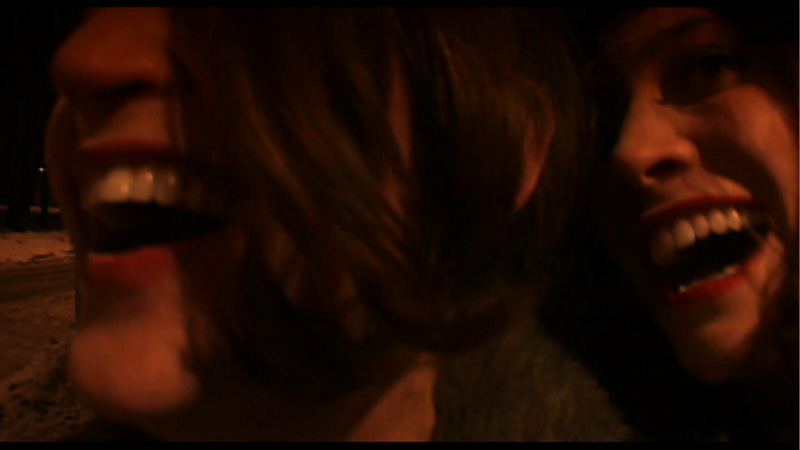
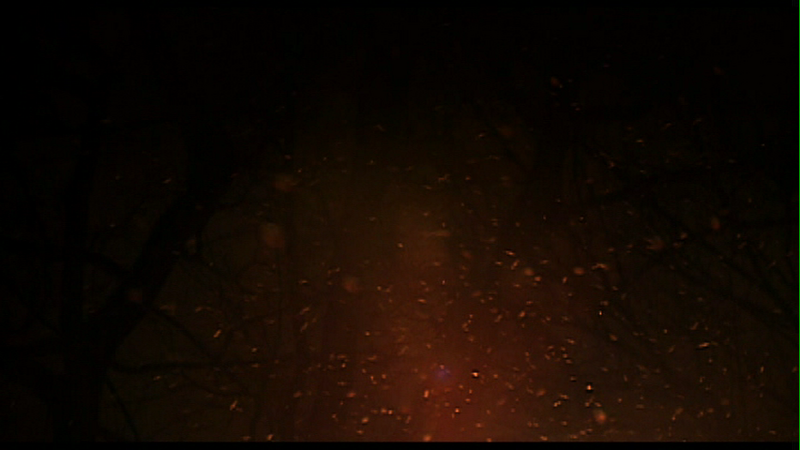
UPDATE: The internet is beautiful, nefarious.
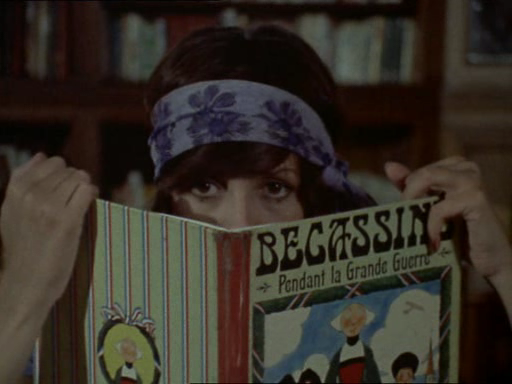
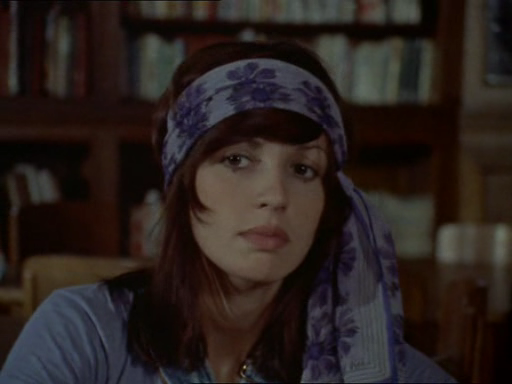




Wow, that would be one hell of a double bill indeed. Six hours of pure cinematic bliss. I can't imagine how dazed and overwhelmed the audience would be after sitting through two such amazing visions.
ReplyDeleteFor some reason, I find that Lynch often pops into mind when I'm thinking of double bills. It may be that his films are so resonant that they seem to naturally interweave with and play off of whatever's in their proximity. And considering Lynch's films in relation to those few directors who are sympathetic with his unique vision is especially fruitful. Naturally, this includes Rivette. Mulholland Drive would go quite well as a double feature with Duelle.
I've also long thought that it'd be amazing to see a marathon of Mulholland Drive and Lost Highway with some of the films that resonate throughout them: Kiss Me Deadly, Vertigo, Persona, Rebel Without a Cause, etc.
Ed: one of the things I dig about Lynch is how his films at once rely on their antecedents and equally diverge from them. He's very interested in how we think about certain forms, certain traditions, certain ingrained expectations. Otherwise, he wouldn't seem so transgressive, and so alive. For me, though, it seems like he can't shake _Sunset Blvd_ more than any other picture. I mean, there's that explicit quote in _INLAND EMPIRE_ (close up of lost girl praying, surrounded by candles, is the same as the quote inside _Sunset Blvd_ where William Holden and Gloria Swanson look back at a picture she made with Von Stroheim, who's projecting the image; it's dizzy that network of signification) but in broader significance is the auto-critique of Los Angeles and the "Hollywood machine" or whatever you want to call it.
ReplyDeleteWhat do you make of _The Straight Story_? I'd love to see that on a double bill with that Anthony Mann picture, _The Far Country_.
I can't believe I forgot to mention Sunset Boulevard, I meant to add that onto the list of films that'd go well in a Lynch-esque marathon. Lynch always claims that he doesn't watch many films, but his own work is bathed in the aura of old Hollywood. It's impossible to watch his best films without pulling up these associations to classic Hollywood. Conversely, Lynch's films inspire critical thinking about the films of the past. I didn't see Kiss Me Deadly until after I'd been thoroughly exposed to Lynch, and I was astonished by how much of it was echoed in subliminal ways throughout his films -- the exploding beach house, the mysterious box, the lost and scared girl, the gas station with the eccentric mechanics, the romantic clench that's half passion, half violence.
ReplyDeleteThe Straight Story is like Lynch where all the surreal and bizarre elements that usually come to the fore in his films are forcefully restrained just below the surface instead. The opening shot is reminiscent of the first scene of Blue Velvet -- Lynch's films very much resonate with one another, too -- except that the moment of submerged terror and violence doesn't break loose. The result is eerie, unsettling and suggestive without providing any resolution.
The Far Country would make for an interesting double bill. I like the Mann picture, and it shares the theme of redemption, but I'm not sure it does justice to the emotional complexity of what Lynch is up to here. Mann's Westerns tend to be based around rigid moral dichotomies, whereas Lynch sees good and evil in more ambiguous shades of gray. There's a great deal of ambiguity in The Straight Story, a lot of details from the past left to the audience's imagination, and though it's often called a story of uplift and inspiration, even the ending is almost completely ambiguous. I like the idea of pairing it with another, very different, road movie about redemption, Jim Jarmusch's Down By Law. Or, for that matter, Dead Man.
I don't know that there aren't _any_ shades of gray in Anthony Mann. Part of why I'd pick that film over something like a Jarmusch is precisely because it's going to challenge the Lynch and tease tensions in an intriguing way. Still: _Dead Man_ might work, too. The sky is big in both pictures.
ReplyDeleteThough I've seen Inland Empire, Celine and Julie, and The Far Country (but not, I sheepishly admit, The Straight Story) ... I have nothing substantial to offer to the discussion so far on those points. It'd be an interesting comparison for Stevens' pair, though, since Rivette's film seems built to me on indirection, obliqueness, opacity, things bubbling up because of (intentional) absences, whereas Lynch's film (which I like less than C&J) is such a head-pounding tour-de-force that whatever comes to the surface is as an after-effect/aftershock/echo. Seems to me, anyway.
ReplyDeleteTo segue: Recently I watched John Ford's When Willie Comes Marching Home (like Olaf Möller said: "whoaaaaaaaaaa"), and I was pretty taken by a Friday/Saturday 1-2 punch of double bills.
Friday night:
It's a Wonderful Life (Capra, '46)
Good Sam (McCarey, '48)
Saturday night:
When Willie Comes Marching Home (Ford, '50)
No Room for the Groom (Sirk, '52)
Anyone with me?
(To clarify: I was pretty taken with the prospect of those double bills, not that I actually ever saw them that way...)
ReplyDeleteRyland: I don't mean to banish shades of gray entirely from Mann, he's a very complex filmmaker. In point of fact, he's made a handful of my absolute favorite Westerns. But the characters Jimmy Stewart plays in his films tend to be torn, caught in a dialectic between extreme good and extreme evil. The very fact that these characters occupy this middle ground at all is an acknowledgment of gray areas. Still, these films tend to view morality like flipping a switch -- in The Far Country Stewart starts out greedy and self-centered until the very end when he is finally all but forced to do the right thing. Lynch, in general, is less clear about what "the right thing" even means. See, your proposed pairing is already eliciting some thought about the two filmmakers, which is of course what any good double billing should do.
ReplyDeleteWell, Zach, I'd be with you if I'd seen more than that yule time classic. I'm with you half-way, though, because I dig all those filmmakers. I would definitely go to those pairs, especially if you wrote the program capsules.
ReplyDeleteEd, I see what you mean. In all honesty I need to see the films again before I can make a complete argument about why I'd pair them -- it just jumped out at me as, well, _right_.
Maybe this is too "on the nose" -- as Ry is wont to say -- but slap me silly: I'd love to see Marnie and Vertigo. It'd be a bummer for sure but it'd be a helluva afternoon.
ReplyDeleteAlso: TWBB with Beau Travail seems "right", too. Any takers?
Yea, Claire, I'm with you on both bills.
ReplyDeleteAgain, thanks NOT to hotlink this image from your HP: http://eigagogo.free.fr/Personnes/Mizoguchi_Kenji/mizoguchi_1.jpg
ReplyDeleteImagehacks works well for that
Not a productive Saturday on the whole, um, chore/work front. But a decidedly cool movie day.
ReplyDeleteToday I watched _Diary of the Dead_ and _Bug_. Brutal fucking murder. Quite a lot to handle. But quite excellent, too. (Say, Zach, did you dig either? Did you even see either?) May go in the complete opposite direction and watch something like, I dunno, _Only Angels Have Wings_ tomorrow for a second time before I return it to Netflix. Which, of course, can be paired with any number of films, but might be viewed well next to, of all things, _The Life Aquatic_: how we seek dominion and fail. Wait. That sounds a lot like that first pair. Oh, right, cuz there's a second part to that first formulation: how we seek dominion and fail -- and how, in the end, we learn to relinquish that desire for control, to live in the world without fear and with, measure by measure, a little joy. I think I'm starting to get Howard Hawks.
Another insanity for not seeing SUNSET BOULEVArd, have to see, my friend said it was his fav esp if ur from LA, what am i waiting for?! what year did that movie come out?
ReplyDeleteAND YESS the internet is beautiful n nefarious [thnkz 4 tha new word]!